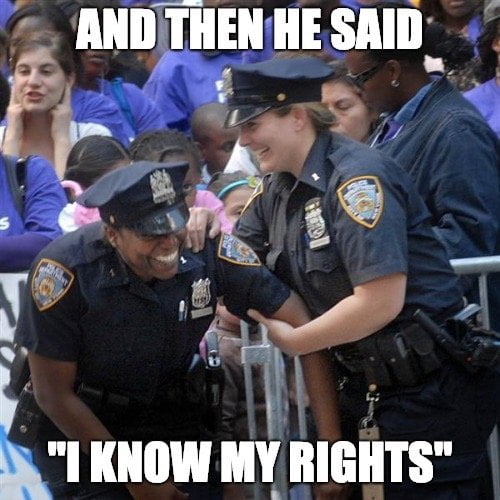Understanding the Miranda rights
If you’ve ever watched a police procedural on TV — from Dragnet to Chicago P.D. — you’ve undoubtedly heard the phrase, “You have the right to remain silent.” But here’s the thing: your rights are worthless unless you use them. Understanding the Miranda rights is important whether you plan on being arrested or not.

miranda rights – best los angeles criminal defense attorney
Find out why you have the right to remain silent, along with your other rights under Miranda, and be sure you know them cold. They can keep you or someone you care about from making a bad situation even worse.
“You have the right to remain silent.” What TV-watching American hasn’t heard that phrase sometime during their lifetime? Of course, hearing the Miranda rights on television and hearing them relayed to you in person are two drastically different scenarios.
Nonetheless, everyone should make themselves familiar with Miranda rights, their impact on a case, and why they’re used. It’s important, should you find yourself being arrested, to know exactly how to act and react.
History of the Miranda rights
The Miranda rights or Miranda “warning” has been around since the 1966 case known as Miranda vs. Arizona, which resulted in a landmark decision by the U.S. Supreme Court. In a 5-4 majority vote, the court determined that when someone is arrested, the arresting officer(s) must let that individual know that they are NOT required to make any statements about what led to the arrest, and that they also have the right to talk to a lawyer.
The law has protected the interests of many individuals since its enactment 50 years ago, although many people still misunderstand its use and intent. For example, some defendants believe they will be released without punishment if they weren’t “Mirandized,” which isn’t true. However, the failure to Mirandize will indeed be to the defendant’s benefit in most cases.
What are your Miranda rights?
Example of a Miranda card provided to police officers to facilitate proper Miranda warnings during arrests.
Quite simply put, here’s what the Miranda rights provide to you if you are taken into custody by law enforcement officers:
You have the right to remain silent, which means you don’t have to answer questions or give statements.
If you do say anything, you must recognize that what you say can be used against you in a court of law.
You have the right to an attorney during questioning — but it is up to you to request one.
If you cannot afford a lawyer, one will be appointed for you – often referred to as a public defender.
When a Miranda warning is required in California
Many states have different Miranda-related laws. In general, however, once a person is in custody and under interrogation, it is required that they receive the Miranda warning. It makes no difference where this happens. It might be in a police car or a police station or someplace else totally unrelated. If the police want to ask questions, Miranda is essential.
It is common for street cops to make an arrest, then not ask questions – so no Miranda is necessary – and then wait for the detectives to Mirandize and interrogate. In that scenario, anything the arrestee says voluntarily while in the back of the police car is admissible because it wasn’t in response to a question by law enforcement.
If the individual is not technically in custody, no Miranda warning is required. Officers may make it clear that the person is not in custody and is “free to go”, but if the person in question begins to talk and provides essential information, the arrest may then be made and any information provided before the arrest can be used in a court of law.
In California, if you are pulled over for a DUI, for example, an officer doesn’t have to immediately read you your rights. Miranda rights must only be read when you are in custody AND you are being interrogated; for example, if they ask you questions about whether you were drinking and how much, or if you were doing drugs. Police are not obligated to Mirandize you if you are pulled over but not yet arrested OR if they have already placed you in custody but they are not interrogating you.

5 tips if you are arrested
No one wants to find themselves in police custody, but if it happens, here are some tips that will help you.
Do NOT make any verbal statements without an attorney present. Talking rarely helps your case. Ask to speak with an attorney immediately and simply respond “no comment” to any questions asked.
Do NOT write any statements or sign any statements written by a police officer.
DO contact a family member or friend as soon as you are able. Often it will not be you making the phone call, but someone else doing it on your behalf. Remember, this is also your right. Once you reach your contact, they can begin the process of gathering resources to get you out of custody.
DO stay calm. Often, we say or do things in panic mode that we wouldn’t otherwise. It’s a tall order but do your best to control your nerves.
DO remember that you have a right to be treated humanely. If you ask for something — water, a request to use the bathroom, etc. — and you are denied, make note of it.
Being arrested is scary but, remember, you have an abundance of rights even though you have been arrested. This is not television; it’s real life. Know your rights and insist that others abide by them.









